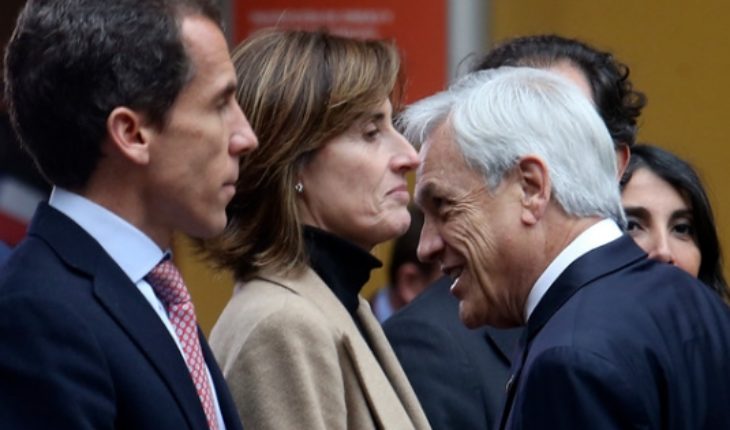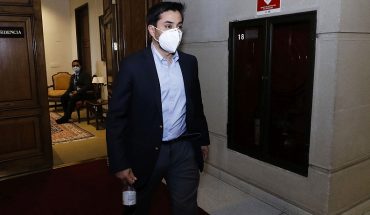project classroom safe sent to Congress by the Government has caused a stir. The law that seeks to make the expulsion of students who participate in acts of violence, most expeditious was checked as a segregated and simplistic formula by the opposition, the student world, specialists and teachers, because it is considered a project that “is not the problem of Fund Manager” who is behind the violence in schools, stressed the MEP Cristina Girardi (PPD), President of the Education Commission of the Chamber of Deputies.
The measure seeks to provide a solution to a series of incidents that have been developed in different emblematic lyceums, in which there have been clashes between police and the so-called “white overalls”, in addition to a series of complaints by actions inside of settlements, which would have been led by students, the occurred at the Lyceum of application being the most remembered. Rise in incidents that would have gone down in recent weeks, once an agreement is reached at the liceo of no intervention by police, while open investigation by arson attacks, detailed sources close to the school institution.
The Government’s initiative has been described as a form of persecution against some student organizations, which reported that in the past year summaries and expulsions of leaders and students from base, have increased without it actually opposite the systemic problem of school violence. “It is not a project that comes to solve the problem of violence in educational communities,” said the Deputy and member of the Committee on education, Camila Rojas (IA), who added that the proposal “does not consider the due process” and “what it does is to criminalize and” remove the problem from one place to another”.
“Segregation and marginalization has been one of the main points of criticism of the policy behind the project, using the strategy of”taking out the rotten apple”secondary schools of elite to integrate them into other establishments, thus cleaning to the so-called” emblematic”. “What we have to do is not chutear the problem of one school to another which is what makes the project safe classroom, they really take charge”, stressed the Deputy Camila Vallejo.
Punitive gaze from the Government have taken the matter as an issue of public safety and security police, more than education. The Ministry of the Interior and the administration took a key role in the Executive communication output, moreover, the weekend was announced a mapping of student organizations which would be after the last acts of violence, in view of the currency- by the white overalls. In a note published by La Tercera, the Minister Andrés Chadwick stressed the intelligence work that have made the police to identify a series of collective student, according to the Mayor of Santiago, Felipe Alessandri, try to “create this mess in public education. I am sure that there is a group that finances them and coordinates”.
The Minister of education, Marcela Cubillos, marked distance of the resolutions submitted by police intelligence. In the program “Mesa Central” of Channel 13, explained that the data were in the process of research and put the accent on the safe classroom project “is a non-criminal disciplinary measure”.
But the issue has positioned itself within the criminal sphere, attempted to call the students involved “violent disguised students”, according to noted own President Sebastián Piñera on the launch of the safe classroom project and it has thus been repeated by various members of the ruling party, as the Congresswoman RN Camila Flores, who stressed that the measure is “essential to give greater powers to directors of schools or high schools to expel the violent students masquerading”.
For a sector of Chile we theme not exhausted or solve measurement and punitive gaze. The Deputy Diego Schalper (RN) stated that the project safe classroom attacks a specific problem and is indeed a breakthrough, that gives more tools to the directors of educational establishments, but “violence in schools is not resolved with that” and highlighted It is necessary to implement a process of educational provision, as also to improve discipline.
In the ruling, some see with distance the Government strategy. They recognize that the measure goes on-line public safety has implemented across the Government, but that is “effective” and “short term”.
For specialist education and director of node XXI Foundation, Víctor Orellana, structurally safe classroom project moves from public education: “it’s smoke, do not have any substance, it not going anywhere, I would say that, rather than project, is an image communication”and then emphasized that there is an”insistence on the punitivismo, which does not solve anything, less in education”.
According to Orellana, the first obligation is to “explain the acts of violence that have occurred in schools, the policy for decades has not heard these young people. “The new forces are obliged to condemn these acts of violence, but also to build in such social movements, different forms of rebellion”.
Educational policy lack the income from the project to the Senate brought with it an internal noise in the ruling bloc. Within the academic world of the centre-right emerged voices that criticized the lack of educational screening measure, a background that would be part of the vacuum that exists on the right on the role of public education, further prioritization of the role of the world private in this field.
Executive director of action education, Daniel Rodríguez, stressed that the project seeks “to facilitate the resolution of a very serious problem, but relatively narrow scope. The Ministry seeks to accelerate a process that already exists in terms of time, I understand it as a very limited project for a problem specific”.
Education specialist, which was part of the program team in the last presidential campaign of Pinera, said that “If the municipalities require this standard to protect their communities is good, but that one would expect after this is one vision more” Systematics of public education and its problems. In this project he fell in the lexicon of the security, the logic of the prevention and the fight against violence, which is not strictly educational”.
Asked about the policy objectives of the Pinera Government on public school education, from the Ministry of education said to El Mostrador that “we have the very specific objective of making public education a real alternative for families. To do this, we must generate all the conditions for settlements to achieve the highest standards of quality and benefit all children and young people in Chile”. They added that “we have our focus on the improvement of the quality in the classroom, which we will achieve through the development of a National Plan of quality”.
A vision which, despite the fact that it seeks to be global, is inadequate for the complexity of dealing with a policy of education at the level of structure. According to experts, this has been a historic lack of the project of the centre-right in Chile, which has tech educational vision and has reduced the role of the State in this area and the structural formation of citizenship. “That right is talking about public education realizes that the debate is not closed, and that the new forces have been advancing, because during the 90s and the 2000 was made to believe that public education and private were the same” , Orellana emphasized.
For Rodriguez, meanwhile, the key is in the lack of political analysis in the sector: “It takes a more profound reflection ending the policy in the short term, that is more consistent, and more characteristic of public education”. A task that would be several think tanks, such as freedom and development or the SHIA, as well as some MPs as Jaime Bellolio (UDI) and Schalper.
The appointment of Undersecretary Raúl Figueroa planted hope in several that come with concern the neglect of public education from the center right. Your look much more ideological and political education, made to think that ” could move forward a little more, but still does not occur, not moving from mere administration,”they stressed from the academic circle on the right.
This absence of theoretical and strategic perspective, “politicians have no alternative, because the ideas that drove the centre-right fail to give the width for one discussion of background, are very superficial.” Professional politicians will have to dip into a more consistent discourse, listen more to Raúl Figueroa and understand what they promote”, said Rodriguez.
This discussion right inside mark a break, according to Orellana, since the debate “for the first time is different from the destruction of public education. The discussion is open and must see if they will prevail very conservative positions, which not only from the dictatorship, but from all national construction, been suspicious and has conspired against public education.”
The demunicipalization an example of this neglect of public education would be the lack of momentum that this Government has been up to now, to the implementation of the new public education, known as “demunicipalization”, one of the main projects educational administration of Michelle Bachelet and which is led by the Department of public education, an autonomous body of the Ministry of education made up of several former members of the Ministry, so much so that between jokes is called the “soviet that left Bachelet to” defend public education”.
The own former President has reobjects that “there were problems on the implementation of the new public education”, but from the Ministry of education, they pointed out that the process of transfer of services from the municipalities to the State “is being made in accordance with deadlines established by law”.
Under the current Government have been created four services and three more should be created to perform the transfer in the year 2020, process that had been led by Rodrigo Egaña, who was appointed by Bachelet and will leave office this year. Rodrigo Roco, former adviser to the Ministry of education of the previous administration is located in the direction of new public education.
The only action of the current Executive on the process of demunicipalization, has been to create the Council of evaluation of the system of public education, which is “composed of six members and chaired by the Under-Secretary for education whose main role is to advise to the” President of the Republic in the evaluation and analysis of the process of implementation of local services”, detailed from the Ministry of education.
But, in the next few months President Piñera must choose the replacement of Egaña. The proposed list would already be in the hands of the President and would mean a real chance to see “will go beyond the mere management required by law”, they were from Chile we.





